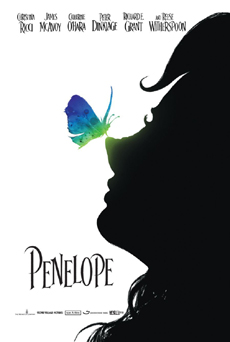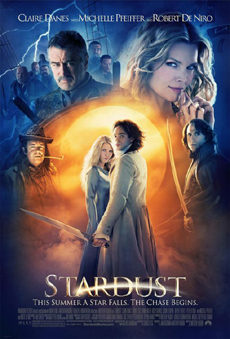One elderly man guards a hole in the wall to prevent villagers from
crossing the wall. A young man, Tristan (Charlie Cox), smitten with
the haughty village beauty (Sienna Miller), promises to retrieve a fallen
star which falls on the other side of the wall. She agrees that if he
returns with the star before her birthday, she'll marry him. Thus begins
his adventure.
Now, because the star landed in the magical realm, Stormhold, it manifests
as a beautiful young woman, Yvaine (Claire Danes). This poses problems
for our hero, as you might imagine. Not to mention the fact that an
evil trio of witchy sisters, headed by Lamia (Michelle Pfeiffer), also
seeks the star, with the goal of cutting out her heart and restoring
their youth and beauty. He also unknowingly competes with several royal
princes, who seek the star because she is wearing the magical necklace
their dying father threw into the sky. Whoever claims the necklace will
assume the throne.
The movie uses the motifs of the quest tale, where the hero is given
magical objects which become useful during the adventure. They encounter
other characters who aid them on their journey, such as a quirky sky
captain, played by Robert De Niro, whose crew captures and bottles lightning
to sell. This is perhaps the strangest role I've seen De Niro play,
and he clearly enjoyed every minute of it.
Naturally, the film is filled with special effects and pays a lot of
attention to details, such as scenery and costume. It is playful good
fun, although at times a little predictable because of sticking to a
fairy-tale plotline.
Although a number of things happen that could have been quite violent
and scary, the filmmakers found ways of making them less so, by showing
most of them off camera. There are some deaths in the movie, so it's
not appropriate for very small children, but it's also not graphically
violent. Older children should enjoy it, and adults will enjoy traveling
across the wall into the imaginary world of fairytales.
Rating (out of 5): ****
 Penelope
is a modern fable about a young woman, Penelope, played by Christina
Ricci. She's the victim of a family curse, put on her great-great-grandfather
when he spurned a servant girl in favor of a socialite. So Penelope
is born with the face of a pig. The curse can only be lifted if someone
of her kind, meaning a blue blood, pledges undying love to her.
Penelope
is a modern fable about a young woman, Penelope, played by Christina
Ricci. She's the victim of a family curse, put on her great-great-grandfather
when he spurned a servant girl in favor of a socialite. So Penelope
is born with the face of a pig. The curse can only be lifted if someone
of her kind, meaning a blue blood, pledges undying love to her.
Her mother, mortified by her daughter's condition, fakes the death
of her young child. Then, when Penelope reaches marrying age, the mother
uses a matchmaker to try to find her a husband, offering a healthy dowry.
All potential suitors must sign a confidentiality agreement as the family
plays a balancing act between finding her a match and keeping her name
and likeness out of the newspapers.
The plans are compromised when a reporter, played by Richard Dinklage
(who was brilliant in The Station Agent), who is holding a grudge
against the family for personal reasons, gets an inkling of what's going
on from a disgusted former suitor. He plants his own potential suitor
(James McAvoy), with the goal of snapping her picture.
But as the young man gets to know her, through talking to her through
a two-way mirror, he begins to have genuine feelings for her. But of
course, such romances can never be easy, and there are complications
that cause trouble, plus some wonderful surprises I won't ruin.
Reese Witherspoon, who produced the movie, plays the supporting part
of Annie, an artsy, leather-wearing free spirit whom Penelope befriends
in a bar. And Catherine O'Hara is at her comic best as Penelope's pushy
but well-meaning mother.
The director found some marvelous ways to make a modern setting feel
magical. One is through the use of color, with bright red used to represent
Penelope's vivid inner life. Her costumes all have fanciful touches,
such as handmade embroidery and flourishes that Penelope herself probably
added. After all, she's been shut away in her room for years with nothing
but her imagination to keep her company.
Penelope is appropriate for all ages, as there's nothing violent
or sexual in it. The most objectionable thing is that several characters
drink alcohol. This magical tale contains a lot of social commentary
and teaches good lessons about self-acceptance, showing that it truly
is OK to be different. I loved the acting in this movie and found Christina
Ricci charming in the title role. Like Stardust, it rises above
the conventions of fable, producing a sweet tale of acceptance.
Rating (out of 5): ****



